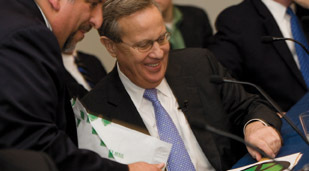 loading
loading
Light & VerityYale and unions make a deal — nine months early Julie BrownLocal 35 president Bob Proto (left) and Yale president Richard Levin with the peace sign Proto brought to a news conference announcing a new three-year contract. View full imageThere is no one who has had a closer look at Yale's historically dysfunctional labor relationship than steamfitter Bob Proto. In his 35 years as a Yale employee, he's participated in seven strikes -- and led three of them, as president of Local 35, the university's service and maintenance workers union. So it was a red-letter day on April 14 when Proto, at a news conference to announce agreement on new three-year union contracts with the university, declared, "Today I'm putting down my strike sign, and I'm carrying a new one." He held up a sign emblazoned with a peace symbol. All the more remarkable, this peace and the new contract were achieved without even a hint of public rancor, nine months before the expiration of the previous contract. By contrast, the last contract in 2003 was approved 20 months after the previous one had expired, and then only after two strikes totalling four weeks. "We hope it's the beginning of a truly new chapter in the history of labor relations here at Yale," said Yale president Richard Levin. The change, both sides say, is the result of six years of work developing a relationship and addressing issues of concern as they arise. "Both sides shouldn't go off as we used to and keep lists of things we're mad about and then bring them to the table when it's time for a contract," said Levin. "That's no way to run an institution. We need to air our problems . . . and solve them one by one." The new contracts take effect in January 2010. Not surprisingly, given the state of the economy, they include smaller wage increases than the previous ones, approved in 2003. Having received between 3 and 5 percent raises for the past eight years, the 1,500 members of Local 35 will get a 2 percent increase in 2010 and 3.25 percent increases in 2011 and 2012. The 3,400 employees in Local 34, the clerical and technical workers union, will have a wage freeze in 2010 (in exchange for some job-security provisions) and 2 percent increases in 2011 and 2012. Local 35 members will continue to have a no-layoffs guarantee, while those in Local 34 may be laid off but will have expanded access to an interim employment pool if they are laid off. Concessions won by the unions include a promise by Yale to review the classification of some non-union jobs that perhaps should rightly be part of Local 34, an assurance that the unions will have jobs on the new West Campus, and improvements in prescription drug coverage. The university secured a reduction in paid time off for new Local 34 employees and a requirement that all new union employees use the Yale Health Plan (rather than traditional health insurance through Aetna) for their first three years. Union officials described the new contract as a win. "In good times this would be a good contract," said Proto. "In these times it's incredible." Local 34 president Laura Smith emphasized the West Campus agreement, which she said offers "the promise that as Yale University grows, so will our unions." The dais at the celebratory news conference -- which, oddly, preceded the actual membership vote on the contract later that evening -- was crowded with university and union officials and local elected officials eager to be associated with the historic accord. In the first row was John Wilhelm ’67, a former leader of Yale's unions who is now a leader of their national parent organization, UNITE HERE. Although Wilhelm said he had little to do with negotiating this agreement, Levin gave him a kind of credit for inspiring the deal. "Last time around John and I spent more evenings in the mayor's office face to face staring at each other than either of us would care to repeat," he said. "We are so glad that we don't have to do that again."
The comment period has expired.
|
|